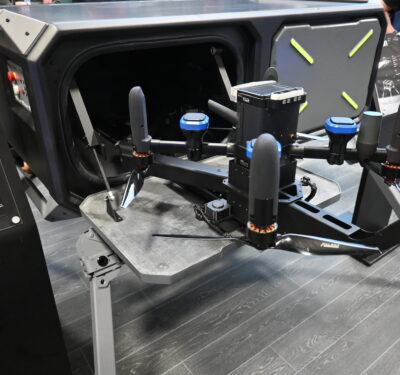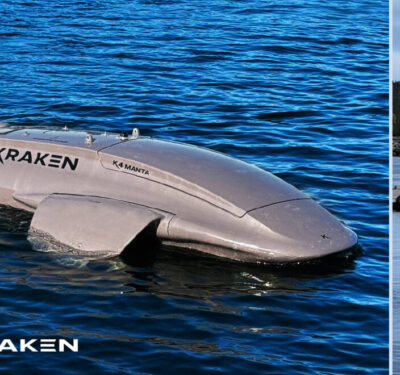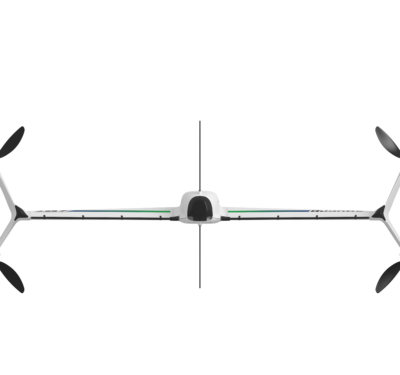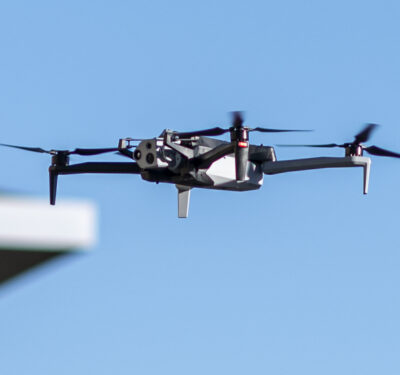The upcoming Army Worldwide Security Assistance Conference (AWSAC), March 5-7 in Crystal Springs, VA, will bring together members of the Army Security Assistance Enterprise (ASAE), Department of Defense (DoD), Department of State (DoS), and U.S. defense industry.
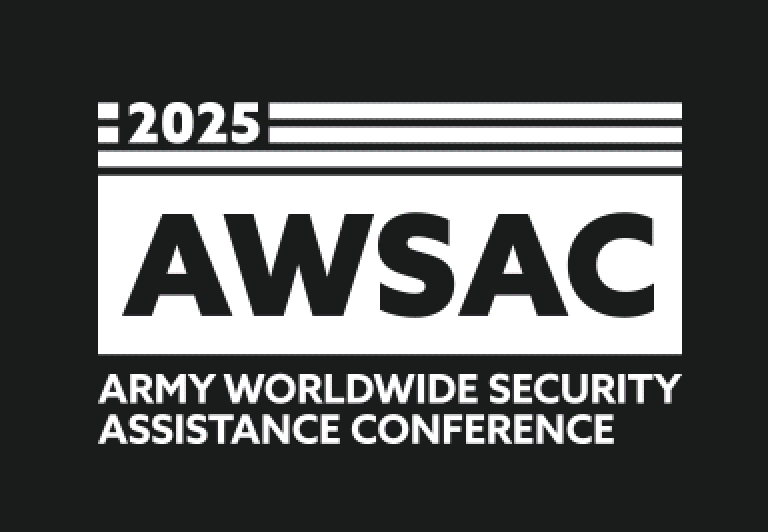
Event co-sponsor AUVSI is providing Inside Unmanned Systems readers with a 25% discount on registration. Use Code AWSAC25IU
Inside Unmanned Systems is an official media partner of AUVSI.
CLICK HERE TO REGISTER TODAY.
Keely Griffith, Vice President, Strategic Programs at AUVSI, details what unmanned systems professionals can expect to learn at the event.
IUS: How does the AWSAC agenda address the integration of unmanned systems into current and future Army operations?
KG: The multi-day agenda features sessions that will possibly address the integration of uncrewed systems and autonomous technologies into current and future Army operations.
While the conference is not solely focused on uncrewed systems, the inclusion of these sessions and specific speakers demonstrates an awareness of the importance of integrating these technologies into Army operations:
- Emerging Technology discussions: Day Two of the conference includes a session on “Developing Next-gen Capabilities | Emerging Tech and Non-POR Materiel”. This session indicates an interest in leveraging new technologies, which would include uncrewed systems, to meet defense requirements. This session includes speakers from companies such as Shield AI and AeroVironment.
- Industry Perspectives: The agenda includes a panel where industry leaders will discuss key FMS challenges and areas for development. Technology is a a key area for Foreign Military Sales (FMS).
IUS: What specific sessions or panels are designed to foster collaboration between the Army and unmanned systems industry leaders?
The AWSAC agenda includes several sessions and panels designed to foster collaboration between the Army and defense industry leaders, including voices from the uncrewed systems industry. Sessions we’re looking forward to include:
- Developing Next-gen Capabilities | Emerging Tech and Non-POR Materiel: This session on Day Two features speakers from companies directly involved in uncrewed systems, such as Shield AI and AeroVironment. The discussion focuses on leveraging technology to meet commitments and balancing capabilities with requirements. This offers a direct opportunity for the Army and industry to engage on the topic of integrating uncrewed systems into Army operations.
- Industry Perspectives on FMS Process | Identify Strengths and Areas for Improvement: Also on Day Two, this panel features leaders from companies like Lockheed Martin, Northrop Grumman, and Anduril, who can share their perspectives on FMS challenges. This panel is designed to identify areas for improvement in the FMS process and may include dialogue on uncrewed systems technologies specifically.
- Building FMS Resiliency | Strengthening the FMS Industrial Base: This panel focuses on innovative methods to increase U.S. industrial robustness, which can include the uncrewed systems sector. This presents a chance for the Army and industry, Textron specifically, to collaborate on how to strengthen the industrial base for uncrewed systems and other defense technologies.
- Congressional Perspective | Achieving Alignment: This Day One panel brings together congressional committee members with industry to discuss priorities for new and emerging technologies, as well as foreign military sales.
- Best Practices on the Job | Program Management Best Practices: This Day One session features speakers from different Army program offices, including PEO Aviation and PEO Ground Combat Systems. This panel provides an opportunity for industry to understand Army acquisition best practices that can be applied to FMS and may touch on areas relevant to uncrewed systems. This panel will be immediately followed by an Industry Perspective panel, including voices from Leidos, Forterra, and NUAIR, discussing key factors that PMs should use to stand out.
IUS: How will the conference’s discussions on Army modernization incorporate unmanned systems to enhance operational capabilities?
KG: Elements of this conference will dive into how uncrewed systems and other defense technologies fit into Army modernization, with key sessions covering Foreign Military Sales (FMS), emerging technologies, and resilience of the defense industrial base.
Discussions will explore how these systems are shaping modernization efforts, featuring industry leaders like Anduril, Shield AI, Textron and AeroVironment. Partner nations will likely also weigh in on the role of uncrewed systems and other defense technologies in security cooperation and defense partnerships.
By bringing together military, industry, and international perspectives, we’re seeking to drive collaboration and innovation in Army operations.
IUS: In what ways does the conference plan to explore the role of unmanned systems in strengthening security assistance programs?
KG: Several panels will address modernization efforts, the FMS process related to emerging technologies and the strengthening of the industrial base. The Industry Perspectives on FMS panel on day two promises to be particularly impactful, with discussion on how current reforms improve the process, and it’s undeniable that the integration of uncrewed systems is a significant component of the FMS landscape. This session aims to align security assistance programs with the capabilities offered by industry. Companies like Lockheed Martin, Northrop Grumman, and Anduril are represented on this panel.
The conference is designed to foster collaboration and open discourse between the Army, industry, and partner nations. By including uncrewed systems companies in the discussions, the conference aims to facilitate the integration of these technologies into security assistance programs.
IUS: What opportunities are there for unmanned systems experts to engage with military leaders and decision-makers?
KG: The event offers a range of opportunities for industry experts to connect with military leaders and decision-makers.
From keynotes and panels featuring top Army officials, to discussions on emerging technologies and the FMS process, the conference provides direct access to those shaping security assistance and modernization efforts.
Beyond formal sessions, networking events, social hours, and informal conversations throughout the conference, can create valuable opportunities to build relationships.
With a strong government presence, AWSAC will be a great setting for defense industry representatives to engage with decision-makers and contribute to the conversation on the future of uncrewed systems in security cooperation.
IUS: Will there be discussions on overcoming current challenges in deploying unmanned systems within Army operations?
KG: Uncrewed systems play a critical role in modern defense, and discussions on overcoming deployment challenges will likely be a key focus, particularly in panels Integrating FMS into Army Modernization and Emerging Technologies and Non-POR Materiel. With strong industry representation and a focus on ensuring a reliable supply of advanced technologies, these sessions will provide valuable insights into addressing integration, capability development, and sustainment challenges.
IUS: Are there any skill accelerator breakouts or professional development sessions tailored for unmanned systems professionals?
KG: The conference includes skill accelerator breakouts and professional development sessions designed for government attendees to enhance their capabilities within the Army Security Assistance Enterprise (ASAE).
During the government only sessions on Day three, AUVSI will host an auditable AUVSI Defense Advocacy Committee session featuring speakers from NATO Joint Capability Group Maritime Unmanned Systems (JCGMUS) and Army G-8 FDH Human-Machine Integration.
IUS: What key takeaways should unmanned systems industry experts anticipate from attending AWSAC?
KG: Industry participants at AWSAC can expect to walk away with a deeper understanding of how these emerging technologies fit into the evolving landscape of security assistance and Army modernization.
This event offers direct engagement with key decision-makers, insights into the FMS process, and clarity on the challenges and opportunities within security cooperation.
Beyond information, AWSAC provides a platform for industry experts to build strategic relationships, identify potential partnerships, and position their technologies for future defense initiatives.
Attendees will leave not just with knowledge, but with actionable connections and a clearer path to navigating the Army’s acquisition and security assistance ecosystem.
Click here to register today with discount code AWSAC25IU


